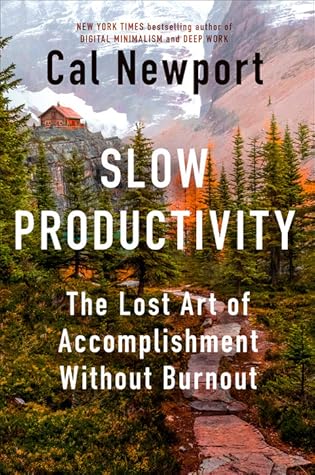More on this book
Community
Kindle Notes & Highlights
by
Cal Newport
Read between
July 5 - July 29, 2025
To embrace slow productivity, in other words, is to reorient your work to be a source of meaning instead of overwhelm, while still maintaining the ability to produce valuable output.
In knowledge work, when you agree to a new commitment, be it a minor task or a large project, it brings with it a certain amount of ongoing administrative overhead: back-and-forth email threads needed to gather information, for example, or meetings scheduled to synchronize with your collaborators. This overhead tax activates as soon as you take on a new responsibility. As your to-do list grows, so does the total amount of overhead tax you’re paying. Because the number of hours in the day is fixed, these administrative chores will take more and more time away from your core work, slowing down
...more
We often take on too much because we don't consider the administrative overhead involved with each commitment. I've had this ongoing struggle with administrative burden without having a name for it and how it affects my overall productivity.
When adding a new project to your holding tank, it’s important to update the source of this new obligation about what they should expect. To do so, send an acknowledgment message that formally acknowledges the project that you’re committing to complete, but that also includes the following three pieces of extra information: (1) a request for any additional details you need from the source before you can start the project, (2) a count of the number of existing projects already on your lists, and (3) an estimate of when you expect to complete this new work. After sending this message, label
I have been thinking about creating a request form to create structure, set proper expectations, and more consistently communicate status with everyone asking for my assistance at work.
What’s needed is more intentional thinking about what we mean by “productivity” in the knowledge sector—seeking ideas that start from the premise that these efforts must be sustainable and engaging for the actual humans doing the work.
Either that or just continue to ask us humans to do more and more until we can't do what's expected without leveraging AI to pick up the slack. We have so often wanted to clone ourselves to get more done... not that's more possible than ever, with AI.


